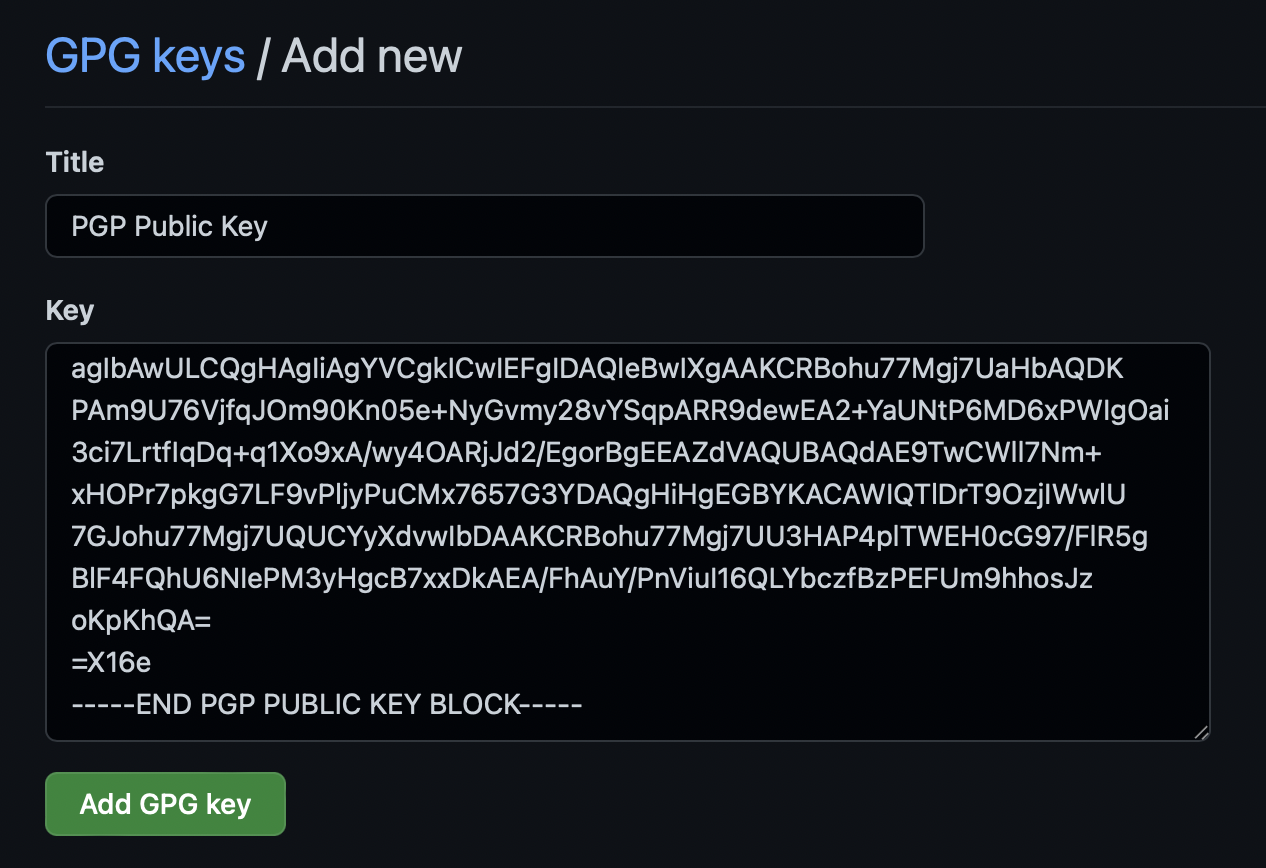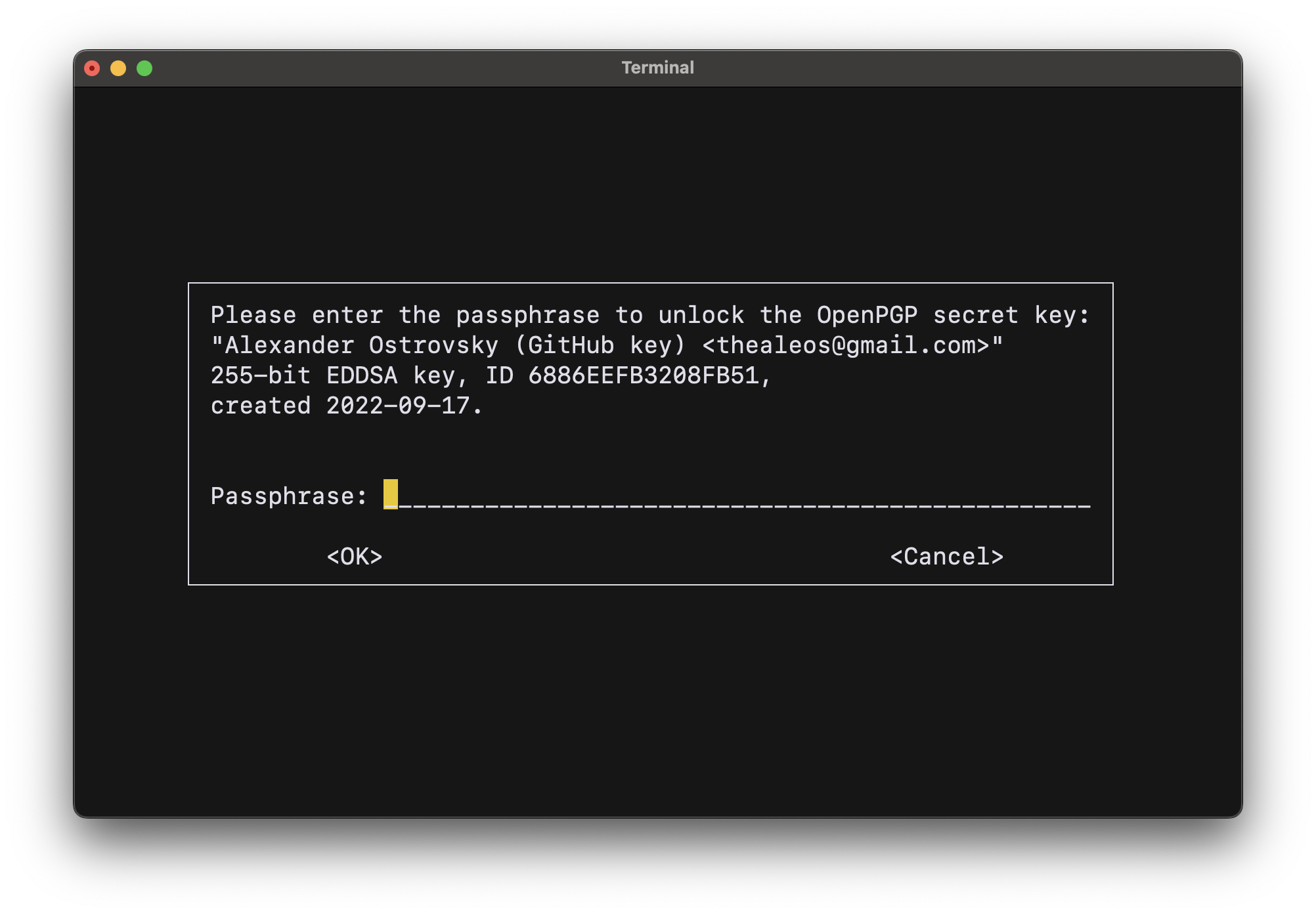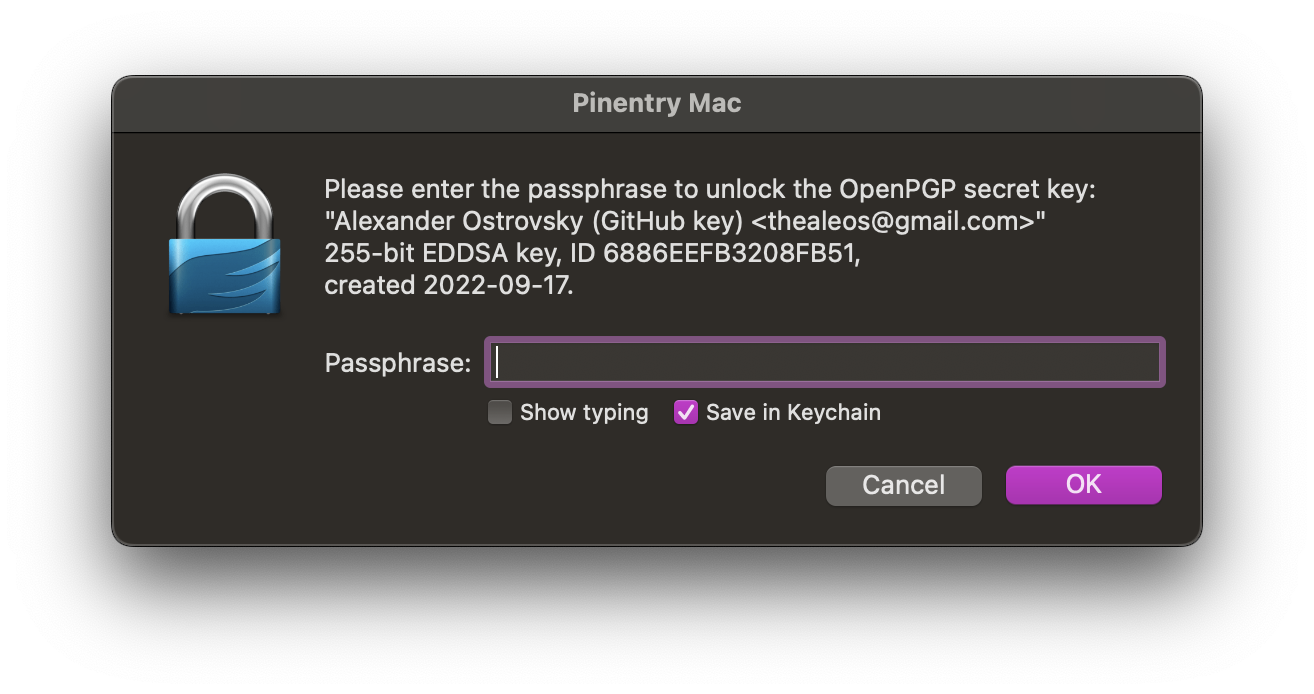For sure you’ve seen that some commits are marked as Verified on GitHub but the most are not. GitHub automatically marks commits as Verified when they were made using the GitHub web interface. It means that the commits were signed by their author so you can be sure that they were made by that author. Although it can look like not a big trouble it can be a good idea to sign your own commits.
You can use gpg or ssh keys for signing.1
Set up GPG Link to heading
Install the gpg utility. The easiest way is to use Homebrew:
brew install gpg
Enable the GPG agent to avoid having to type the secret key’s password every time. To do that, add use-agent key to ~/.gnupg/gpg.conf:
mkdir -m 700 ~/.gnupg
cat << EOF >> ~/.gnupg/gpg.conf
# Tell GPG to use the gpg-agent
use-agent
EOF
Set the GPG_TTY variable required2 by the gpg-agent in ~/.zshrc:
cat << EOF >> ~/.zshrc
# Set the GPG_TTY variable required by the gpg-agent
export GPG_TTY=$(tty)
EOF
Restart your Terminal or run:
source ~/.zshrc
Generate your GPG key pair Link to heading
Generate a GPG key pair3:
gpg --full-generate-key
It’ll ask a few questions about the key. The suggested default options are good so you can use them:
% gpg --full-generate-key
gpg (GnuPG) 2.3.7; Copyright (C) 2021 Free Software Foundation, Inc.
This is free software: you are free to change and redistribute it.
There is NO WARRANTY, to the extent permitted by law.
gpg: keybox '/Users/aleos/.gnupg/pubring.kbx' created
Please select what kind of key you want:
(1) RSA and RSA
(2) DSA and Elgamal
(3) DSA (sign only)
(4) RSA (sign only)
(9) ECC (sign and encrypt) *default*
(10) ECC (sign only)
(14) Existing key from card
Your selection?
Please select which elliptic curve you want:
(1) Curve 25519 *default*
(4) NIST P-384
(6) Brainpool P-256
Your selection?
Please specify how long the key should be valid.
0 = key does not expire
<n> = key expires in n days
<n>w = key expires in n weeks
<n>m = key expires in n months
<n>y = key expires in n years
Key is valid for? (0)
Key does not expire at all
Is this correct? (y/N) y
GnuPG needs to construct a user ID to identify your key.
Real name: Alexander Ostrovsky
Email address: thealeos@gmail.com
Comment: GitHub key
You selected this USER-ID:
"Alexander Ostrovsky <thealeos@gmail.com>"
Change (N)ame, (C)omment, (E)mail or (O)kay/(Q)uit? O
You need a Passphrase to protect your secret key.
Add your GPG key to GitHub Link to heading
List the GPG keys:
gpg --list-secret-keys --keyid-format=long
Copy the long form of the GPG key ID. In this example, the GPG key ID is 6886EEFB3208FB51:
% gpg --list-secret-keys --keyid-format=long
/Users/aleos/.gnupg/pubring.kbx
-------------------------------
sec ed25519/6886EEFB3208FB51 2022-09-17 [SC]
E50EB4FD3B38C85B0954EC626886EEFB3208FB51
uid [ultimate] Alexander Ostrovsky (GitHub key) <thealeos@gmail.com>
ssb cv25519/45F1C3043B776FD2 2022-09-17 [E]
Copy your GPG key:
gpg --armor --export 6886EEFB3208FB51 | pbcopy
Add this key to “GPG keys” section in your GitHub profile settings.4

Sign your commits Link to heading
Using command line Link to heading
Add signing key to the git config:
git config --global user.signingkey 6886EEFB3208FB51
Tell git to sign all your commits:
git config --global commit.gpgsign true
From now all your commits will be signed. It can be overkill for you. It is possible to set commit.gpgsign on per-repository basis or only for certain commits using -S option with git commit command.
gpg will ask you to enter the passphrase to unlock the OpenPGP secret key when it’s called for the first time:

After making a signed commit you can check that the commit was signed:
git log --show-signature -1
With a result like this:
% git log --show-signature -1
commit e20d871441001833f7bc024a9140236d7cac71e9 (HEAD -> sign-github-commits, origin/sign-github-commits)
gpg: Signature made Sun Sep 18 12:08:41 2022 MSK
gpg: using EDDSA key E50EB4FD3B38C85B0954EC626886EEFB3208FB51
gpg: Good signature from "Alexander Ostrovsky (GitHub key) <thealeos@gmail.com>" [ultimate]
Author: Alexander Ostrovsky <thealeos@gmail.com>
Date: Sun Sep 18 12:08:40 2022 +0300
Add a new article "Sign GitHub Commits"
Using apps Link to heading
Tell git a path to the gpg to help apps to find it:
git config --global gpg.program $(which gpg)
Unfortunately not all apps can request the passphrase because pinentry (gpg-agent uses to unlock the secret key) is a command line utility. For example Atom can but Xcode can’t. To solve it install pinentry-mac:
brew install pinentry-mac
And tell gnupg the path to it in the gpg-agent.conf:
echo "pinentry-program $(which pinentry-mac)" >> ~/.gnupg/gpg-agent.conf
Then reload the gpg-agent to apply the changes:
gpg-connect-agent reloadagent /bye
From now if gpg-agent hasn’t cached passphrase yet it will ask you by using a pinentry-mac utility:

Unfortunately although pinentry-mac has an option to save credentials to your Keychain I was unable to make it work. You can check whether pinentry-mac saved passphrase in your keychain:
security find-generic-password -s 'GnuPG'
🎁 Bonus Link to heading
You can find lots of additional info about using GnuPG in archlinux wiki.
Backup Your Private Key Link to heading
To backup your private key do the following:
gpg --export-secret-keys --armor --output pgp-private-key.asc thealeos@gmail.com
You should store the backup in a really safe place. To import the backup when you need it:
gpg --import pgp-private-key.asc
You might want to backup your revocation certificates located in ~/.gnupg/openpgp-revocs.d/.
Read more in the “Verify commit signatures” section of GitHub Docs. ↩︎
gpg-agentenvironment requirements: “Invoking GPG-AGENT” ↩︎“Generating a new GPG key” in GitHub Docs ↩︎
“Adding a GPG key to your GitHub account” in GitHub Docs ↩︎